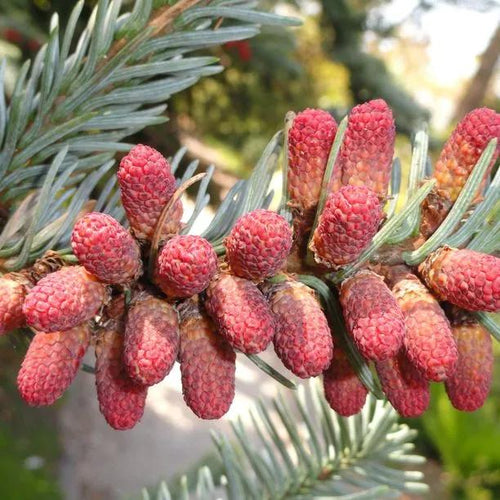
 Delivered across the UK
Delivered across the UK Which Best Plant Supplier 2025
Which Best Plant Supplier 2025 1 Year Bareroot Plant Guarantee
1 Year Bareroot Plant Guarantee
About Noble Fir Sapling Trees
Noble Fir Sapling Trees
- Use: Specimen tree, tall screening
- Not suitable for clipped hedging
- Height: Up to 55m
- Growth: Medium to fast. Straight trunk
- Soil: Deep, moist, well-drained
- Light: Full sun
- Type: Large evergreen conifer
- Species: Abies procera
- Bareroot Delivery Only: Nov-March
Appearance, Growth & Uses
Noble Fir is a big evergreen conifer that develops into an impressive specimen tree with a distinctive straight trunk and classic conical form.
This majestic tree reaches up to 55 metres in ideal conditions, with medium to fast growth once established.
The attractive, upswept blue-green needles have silvery undersides, some the prettiest and brightest of all conifers.
Noble Fir also has spectacular cones. The big chunky upright female cones sit on top of the branches until they disintegrate into seeds in Autumn, while dense clusters of ruddy-purple male cones swarm the undersides, looking lovely against the bright foliage.
It excels as a tall screening tree, providing year-round privacy.
The vibrant evergreen foliage and impressive stature make it an excellent architectural specimen for large gardens.
Browse other large garden trees, other conifers, or our full range of trees.
Growing Conditions
- Soil: Deep, well-drained soils
- Light: Full sun to partial shade
- Moisture: Prefers consistent moisture
- Avoid: Waterlogged, very dry soils, or shallow chalk
- Maintenance: Minimal once established
- Hardiness: Very hardy, reasonably wind resistant
Noble Fir thrives in deep, well-drained soils, preferring moist, slightly acidic conditions.
Young trees are reasonably shade-tolerant, but ideally should grow up into full sun for the best cone display and dense, compact growth.
It's not suitable for urban pollution or very exposed sites.
Garden Design Ideas
Use Noble Fir as a magnificent specimen tree in large gardens where its impressive cones and blue-green foliage can be appreciated year-round.
Plant as a single focal point or in small groups at 5-8 metre spacing.
Perfect for creating dramatic backdrop plantings and framing views with its impressive vertical structure.
The lustrous foliage is great for winter interest.
Excellent for tall screening, but not recommended for frontline windbreak plantings.
History & Trivia
Abies procera is native to the Pacific Northwest, from Washington to Northern California, where it's known as the Red Fir or Tuck-Tuck Pine.
It grows in mountain forests at elevations up to 1,500 metres.
Introduced to Britain in 1825, it was originally classified as Abies nobilis by intrepid Scotsman David Douglas (1799–1834), after whom the Douglas fir is named.
However, the name Abies nobilis had already been given to the European silver fir (which has since been renamed Abies alba: do try to keep up), so the noble fir had to be renamed Abies procera, which means tall.
In its native habitat, Noble Fir can live for over 700 years and reach heights exceeding 90 metres, making it one of the tallest trees in North America, practically as big as the giant sequoias.
The timber is one of the finest softwoods, with straight grain and excellent strength properties, highly valued for construction.












 Secure, One-Tap Checkout
Secure, One-Tap Checkout
 Hand Picked, Delivered to Your Door!
Hand Picked, Delivered to Your Door! 1 Year Bareroot Guarantee
1 Year Bareroot Guarantee

